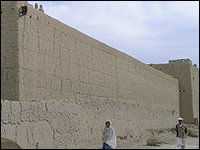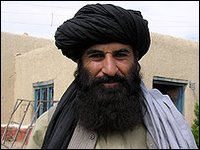
Musharraf has a habit of putting his foot in his mouth quite frequently and he has obviously done it again while giving an interview to the UK Guardian.
The UK Guardian's editors, for reasons known to them, chose the heading and twisted the knife ever so slightly by adding the word ‘insists’. By choosing this word it made it sound as if the newspaper didn’t quite believe Musharraf’s protests to the contrary. So it goes:
Well, what else could you expect from a liberal newspaper.
____________________________________________
Blogger's Comment on the InterviewWith his popularity in a tailspin, it does seem as if Musharraf is a worried man. Part of the problem lies in the fact that he has opened one too many front for his own good. But then again he is a Pakistani commando – he acts before he thinks.
His regime’s position in Waziristan is fast becoming untenable. A couple of days he had to eat humble pie when he declared ‘Troops will be pulled out of Waziristan if the tribesmen cooperate’. A one-way compromise in Waziristan seems definitely on the cards, but I fear it will make no difference to the Taliban.
In Balochistan it appears to me that it is more of a case of personal ego. One can surmise this from the language he uses when talking about the Baloch leadership. Even in this latest Guardian interview he cannot refrain from calling them ‘pygmies’ and 'mercenaries', and the insurgency mere 'pinpricks’. The use of thousands of troops, helicopter gunships and air force bombers clearly belies his rhetoric.
A Baloch acquaintance recently told me this:
Fifty-five plus years ago when Musharraf was still in his shorts playing gulli-danda people like Akbar Bugti and Khair Buksh Marri were men of social and political significance. Culturally arrogant, these men remain disdainfully contemptuous of him, treating him as somewhat of an upstart. Musharraf, who has in recent times become accustomed to being feted in the White House, Downing Street and the Kremlin, is personally outraged by their behaviour, especially when the rest of Pakistan happily kowtows before him (however temporarily). It has become a personal issue with him and he sees red whenever mention is made of them.
I think there is more than a grain of truth in what he said.
Anyhow, do read the interview.
_____________________________________
Musharraf insists: I'm not George Bush's poodle
· General says US air strikes infringe sovereignty
· President denies running military dictatorship
Declan Walsh and Simon Tisdall in Rawalpindi, Friday April 28, 2006
General Pervez Musharraf, facing a surge of anti-American sentiment, yesterday warned that covert US air strikes against al-Qaida inside Pakistan were an infringement of national sovereignty.
Admitting that his popularity was waning, the Pakistani president insisted he was "not a poodle" of George Bush and rejected accusations he was running a military dictatorship.
Speaking to the Guardian at Army House in Rawalpindi weeks after a tense visit by the US president that brought a torrent of domestic criticism, Gen Musharraf insisted he was his own man.
"When you are talking about fighting terrorism or extremism, I'm not doing that for the US or Britain. I'm doing it for Pakistan," he said. "It's not a question of being a poodle. I'm nobody's poodle. I have enough strength of my own to lead."
If necessary he had "teeth" to bite back, he added. "Yes sir, I personally do. A lot of teeth. Sometimes the teeth do not have to be shown. Pragmatism is required in international relations."
Gen Musharraf pledged to hold free and fair elections next year as urged by Mr Bush during his visit to Islamabad last month. Opposition parties fear the poll, which government officials claim will be the most open since Gen Musharraf seized power in 1999, will be rigged.
"It is ironic that I'm sitting in uniform talking of democracy ... but to bring democracy into Pakistan I thought I needed it," he said.
An American Predator drone fired Hellfire missiles at a house in Bajaur tribal agency in January, killing 18 people but missing their target, al-Qaida's second in command, Ayman al-Zawahiri. The attack near the Afghan border caused public uproar and brought renewed accusations that Gen Musharraf was a US puppet.
Local journalist Hayatullah Khan, who photographed missile fragments linking the strikes to the US, disappeared four days later and is still missing. A western diplomat said he was probably being held by Pakistani intelligence and may have been mistreated.
The strike underlined tensions in the anti-terror alliance between Pakistan and the US, which has also been strained by Washington's nuclear deal with India, its insistence on democratic reforms, and alleged American meddling in the sprawling south-western province of Baluchistan. "The strike was an infringement of our sovereignty and I condemned it," said Gen Musharraf.
Pakistan also faces criticism from the US and Afghanistan for not doing enough to flush extremists from its tribal areas. Mr Bush said he had come to Islamabad "to determine whether or not the president is as committed as he has been in the past to bringing these terrorists to justice".
Gen Musharraf insisted yesterday there was no question of Pakistan submitting to American scrutiny and said claims that his government acted at Washington's bidding were nonsense. "There is no need of any checks - that is the reality," he said.
Gen Musharraf, who faces revolts in Baluchistan and along the Afghan border, admitted to feeling embattled. He added that there was a growing problem of "Talibanisation" in Waziristan, a troubled tribal area where several hundred al-Qaida suspects have been killed.
The battle against al-Qaida was almost won in Waziristan, he said. "Because of our successes in the cities where we got 600-700 of them, and then in the mountains where we occupied their sanctuaries, thankfully they are on the run."
But a new form of local fundamentalism was taking its place in Waziristan, which is ruled directly from Islamabad under colonial-era laws. "Extremism in a Talibanised form is what people are now going for. Mullah Omar and the Taliban have influence in Waziristan and it's spilling over into our settled areas."
This week militants occupied a market in the regional capital, Miran Shah, for several hours, burning newspapers and threatening local people. Two taxi drivers accused of collaborating with coalition forces in nearby Afghanistan were found beheaded. More than 150 pro-government elders and officials have been killed in the past year.
Gen Musharraf defended his tactic of using military force instead of negotiation to quell the violence and said some collateral damage was inevitable when militants' hideouts were attacked.
"We take extreme care to be 100% sure of the target from all sources of intelligence ... There is minimum collateral damage. If someone happens to be very close to [the target], that somebody is an abetter and they suffer the loss. Sometimes, indeed, women and children have been killed but they have been right next to the place. It's not that the strike was inaccurate but they happen to be there, so therefore they are all supporters and abetters of terrorism - and therefore they have to suffer. It's bad luck," he said.
Gen Musharraf also played down unrest in the resource-rich province of Baluchistan, where nationalist militants are blowing up gas pipelines and trains and attacking army positions. He described the rebels as "mercenaries" and their attacks as "pin pricks", and said the disturbances were confined to one-twentieth of the province's area.
"So what revolt are you talking about? People talk about an East Pakistan situation," he said, referring to the secession of Bangladesh in 1971. "I understand strategy. These people are pygmies."
Criticism of his military-driven strategy came from "people who sit in drawing rooms and talk", he said, but added that a political solution was also being sought.Gen Musharraf has survived two assassination attempts but elections scheduled for next year are expected to pose the greatest threat yet to his grip on power. Overt and behind-the-scenes US and British pressure for a free poll has become another friction point in the west's relationship with Islamabad.
The leaders of the two main opposition parties, Benazir Bhutto of the Pakistan Peoples party and Nawaz Sharif of the Pakistan Muslim League, are in exile and face arrest if they return home. Meeting in London this week they launched a fresh political alliance and called for western support.
Gen Musharraf said his mission was to democratise Pakistan. "My popularity has gone down ... but at this moment my country needs me. I've put a strong constitutional democratic system in place. That will throw up a successor. I'm a strong believer in democracy."
_____________________________________________
Pakistan














